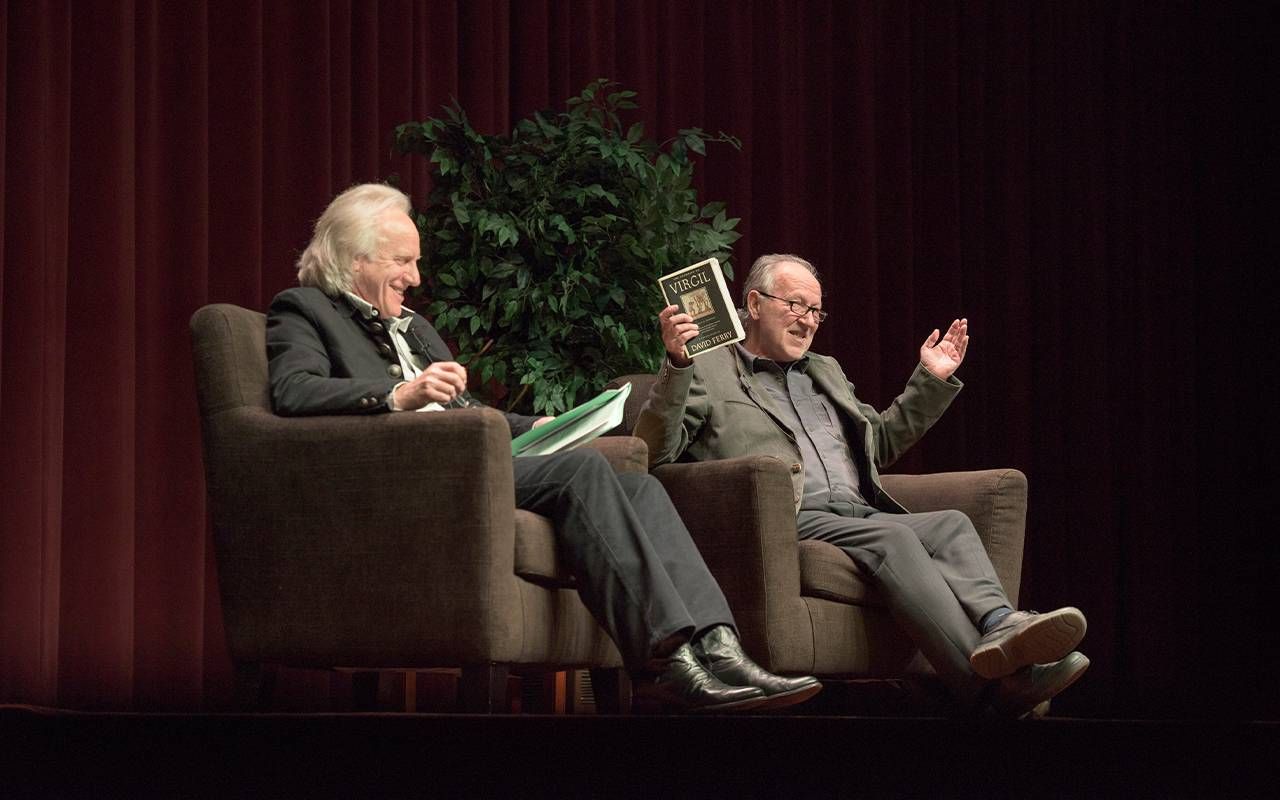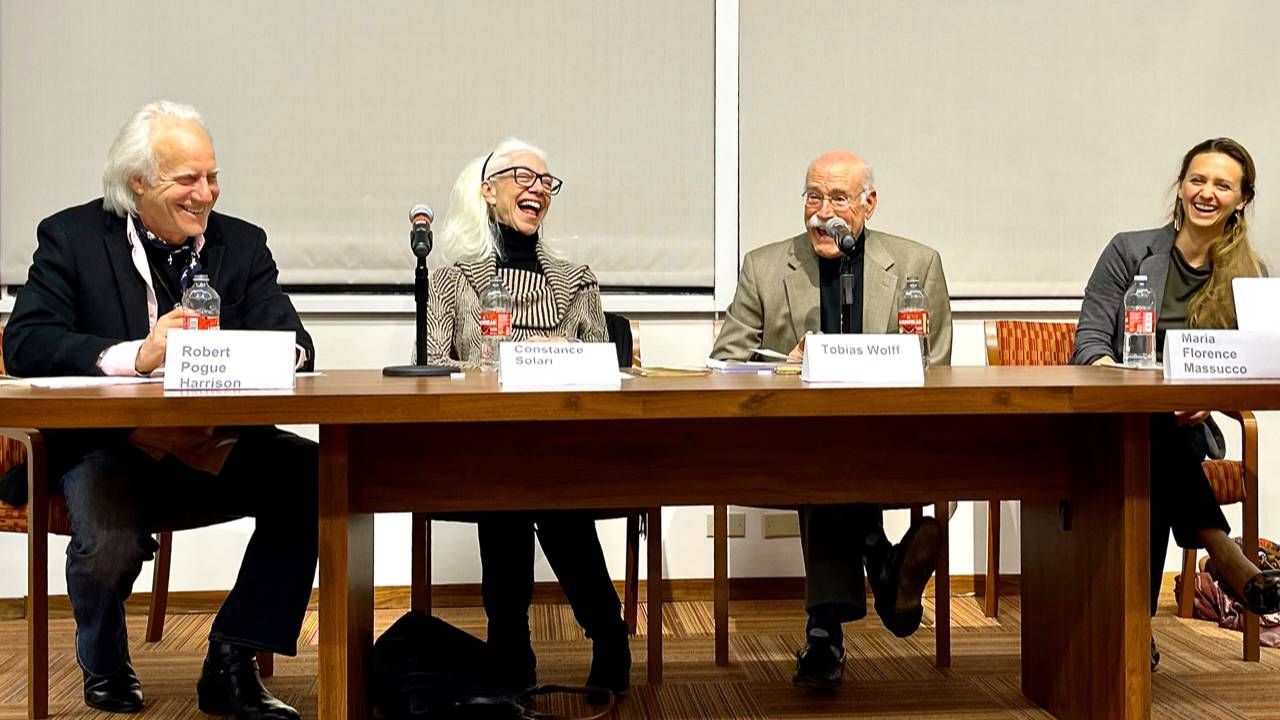University Book Clubs Discuss Books Years After College Days End
Fiction, non-fiction, robust discussions and occasional appearances by famous writers keep readers on the same page
The Continuing Studies Program of Stanford University was stunned when 961 people attended its book club's free talk about "A Room of One's Own," Virginia Woolf's 1929 classic, in April 2023, in person or via Zoom.
But then, it's not just any book club. German filmmaker Werner Herzog has been a speaker. Philip Roth agreed to an interview. The club always features panelists who are scholars or writers, who discuss a book before opening to audience questions. Ostensibly for the Stanford community, the club is in reality for anyone who wants to listen, since its talks are posted on the Another Look Book Club website and on YouTube.

This club shines a spotlight on books that are forgotten or merit more attention, some plucked from obscurity, others read decades ago, that are short (200 pages or so) and in print. Almost entirely fiction, book choices span almost 400 years and three continents, from "The Queen's Gambit," which became a Netflix series, to "The Princesse de Cleves," a 1678 book most people are unfamiliar with. (Unless you're a public sector worker in France, whose entrance exams include questions on it. After Nicolas Sarkozy, then President of France, denounced the book in 2009, sales doubled in a year.)
"Ask the Dust," a 1939 novel set in Depression-era Los Angeles, "The Lover," a novel about Vietnam in French Colonial days and "The Strange Case of Dr. Jekyll and Mr. Hyde" show the club's range.
Why so much fiction?
The Language of Fiction
"Fiction is a universal language – it's storytelling, everyone loves to get into a good story. Our books should feed into the pleasure principle," says Another Look's director, Robert Harrison, a Stanford professor of Italian and French Studies and host of Entitled Opinions, a podcast on books and ideas since 2005. "If we did essays, we'd lose half our audience. Fiction and poetry don't let it all hang out. You want to have something to interpret, secret tunnels and layers of meaning."
"You want to have something to interpret, secret tunnels and layers of meaning."
A bit of cross-pollination transpires between the club and podcast. Herzog came to Stanford because his wife, photographer Lena Herzog, was a guest on Entitled Opinions, and discovered by chance that he and Harrison both loved "The Peregrine," a little-known 1967 book about the falcon that, at that time, had almost disappeared from England. He returned to discuss it at the book club in 2016, an in-person event where over 700 people showed up.
Another Look shares almost all of the points an article in The Atlantic suggests to run a successful book club. It's specific about the book types to be read, picks books that spark discussion – not crowd-pleasers everyone will love – and has a strong leader to ask probing questions.
Not Necessarily Crowd-Pleasers
"Sometimes people will complain to Cynthia after a book is chosen or after reading it. But after an hour-and-a-half of discussion, there's a revelation," Harrison says. "They write back. It's like 'Whoa! I didn't get it.'"
"Sometimes people will complain to Cynthia after a book is chosen or after reading it. But after an hour-and-a-half of discussion, there's a revelation."
But Cynthia Haven, who manages Another Look, wonders if it's even a book club. "There are no dues, we don't keep track of our members or vote on anything, you can come if you want or not. We have a mailing list of over 3,400 now," says Haven, author of a biography of Rene Girard, the late Stanford professor who coined the term "mimetic desire" to explain how our desires are often not our own, years before social media proved the phenomenon.
In fact, when book club founder Tobias Wolff, a Stanford professor of English, memoirist ("This Boy's Life") and novelist asked Haven, who writes a book blog for Stanford, in 2012 to create a forum for people to discuss books with writers and Stanford scholars, she was dubious.
"I had an image of book clubs as a fuddy-duddy thing, and books chosen as middle-brow 'safe' choices," adds Haven, who is a National Endowment for the Humanities scholar. "Ours is very open. It's a book club for people who don't have time to read." Harrison became director in 2015, taking over from Wolff, and "internationalized" the book picks, but Wolff continues as a panelist in the book club, which meets three times a year.
For Non-Fiction Fans
In contrast, the Santa Clara University Alumni book club reads lots of non-fiction, votes on the book choices, and meets every two months, virtually only. Every week, members get an email that poses a question for discussion, links to the online forum to interact and suggests a related article to read or video to watch.

Nonfiction book picks range from "Educated" by Tara Westover, "Talking to Strangers" by Malcolm Gladwell, "The Lost City of the Monkey God" by Douglas Preston, about the discovery of a legend-ridden ancient city in the Honduras jungle, "Maybe You Should Talk to Someone" by Lori Gottlieb, about her journey into the human psyche both as a psychotherapist and patient, and "The Monk of Mokha" by Dave Eggers, about a San Francisco man who travels to Yemen, his ancestral homeland, to learn about and collect types of coffee, but gets trapped during its civil war.
"People are passionate about their coffee," says Maria von Massenhausen, director of the book club and associate director of program management in alumni relations at Santa Clara, of Eggers' book. "It provoked a lively discussion on the board." Members can read the list of discussion questions in one fell swoop, or space out the questions, at a pace they choose.
"A reader lives a thousand lives before he dies. The man who never reads lives only one," wrote George R.R. Martin, whose fantasy novels became "Game of Thrones."
Asked if her club has a focus on Bay Area authors – like Eggers and Isabel Allende (niece of Salvador Allende, the former socialist president of Chile) – von Massenhausen demurs, "Not at all." What she does focus on, and encourages more of, is alumni authors, pointing proudly to the Alumni Book Shelf of the private Jesuit university in Silicon Valley, which includes Khaled Hosseini, the Afghan-born author of "The Kite Runner," and Anna Yen, a former tech executive and author of "Sophia of Silicon Valley."
PBC Guru manages the book club for Santa Clara, among the virtual book clubs it runs for 250+ universities, from Northwestern, Michigan State, U of Virginia to Cambridge University in England. The company customizes clubs to the university's interests, whether it's memoirs, fiction or social justice, and handles most of the work involved, creating content for the weekly emails, providing a moderator to handle members' questions during the meeting, running the platform to suggesting books.
Von Massenhausen tells PBC Guru she wants a "very wide variety from non-fiction, fiction to period pieces - our alumni are lifelong learners" and live author events, and her rep counters with three book recommendations each cycle. Then, book club members vote on the final choice.
The delights of reading a great book are many. Just one: "A reader lives a thousand lives before he dies. The man who never reads lives only one," wrote George R.R. Martin, whose fantasy novels became "Game of Thrones." But forging connection and learning more about each other and the human condition is the main goal of book clubs, The Atlantic notes. These university book clubs do this in spades.
Read More

